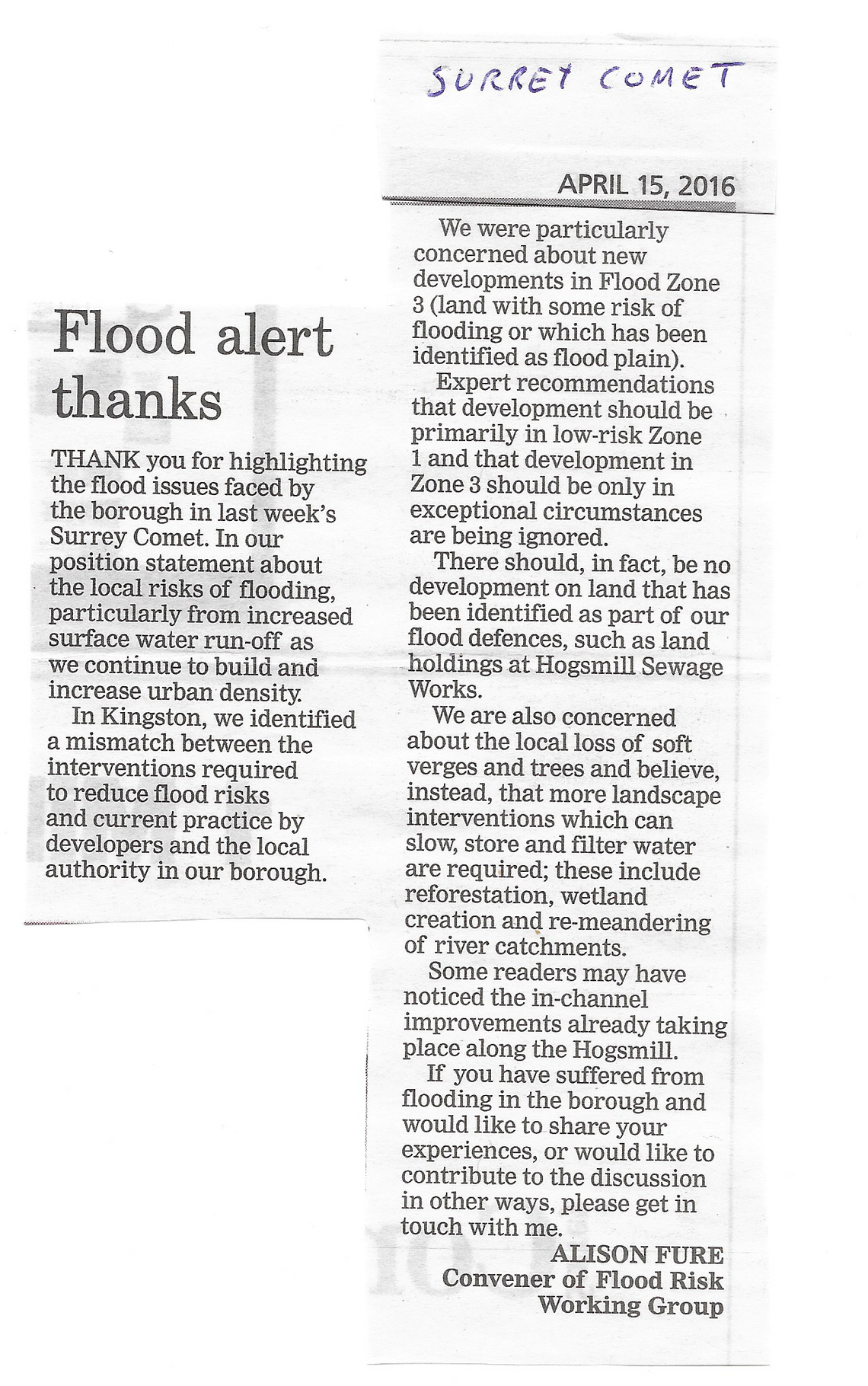The latest piece of work from a group including KEF), TTK, Kingston Environment Centre… - a paper on local flood risk assessment, now published on the KEF website at http://e-voice.org.uk/kef/about/view/flooding/Flood_Risk_Position_statement_with_photos.pdf.
This is a very timely document, given recent weather, forecasts of a warmer and wetter UK as a result of climate change, and the impacts of local developments on flood risk. We have seen how devastating flooding can be in other parts of the UK, and would like to see Kingston adequately protected.
A follow-up letter was published in the Surrey Comet on 15/4/16 (see below).
Press release, March 2016: Local environmentalists express concern about Kingston’s flood risk (and here is the story in the Surrey Comet, 8/4/16 and in Surrey Comet on-line here.
Concerned at the impacts of climate change and local development on local flood risks, a working party of local environmentalists, including representatives from Kingston Environment Forum, Transition Town Kingston and Kingston Environment Centre, has published a statement on local flood risk assessment at http://e-voice.org.uk/kef/about/view/flooding/Flood_Risk_Position_statement_with_photos.pdf.
“This is a very timely statement, given recent wet weather and local flood warnings[1] and flood events. Excess water has to go somewhere, but preferably not into homes and businesses,” says the group. “We have seen how devastating flooding can be in other parts of the UK, and we want to see Kingston adequately protected.”
The statement expresses concern at loss of soft verges and trees and increases in hard surfaces and urban density, which put pressure on natural and man-made drainage systems. Flood-plain land which could be used for water storage in emergencies is being sold off for development – and standing water is now increasingly being retained on low-lying areas such as Kingston Recreation Ground and Hogsmill Sewage Works throughout the winter. New developments and population growth will increase the pressures on aging suburban drains; and one effect of climate change seems to be increased and heavier rainfall: flooding that was formerly expected to occur once in 100 years now happens with increased frequency[2], and many recent flood events were caused by urban storm water run-off (pluvial flooding). These factors make it vital that Kingston Council updates its flood risk strategy, making flood prevention a priority, applying the strategy determinedly in planning decisions, and enforcing flood alleviation measures.
Amongst the counter-measures suggested in the document are:
- All new developments, large or small, should entail no net loss of drainage, and ideally should provide a net gain to compensate for past neglect and increased population.
- The Council should not be paving over grass verges (as recently in New Malden).
- Trees should be planted in the borough, not removed as in Chessington which suffers from pluvial flooding.
- There should be no development on areas identified as being part of our flood defences, such as Thames Water land at Hogsmill Sewage Works.
- Kingston’s flood risk assessment and emergency plans should be up-to-date, robust and well publicised to residents.
Notes for editors
For further comment and information please contact Alison Fure or Jean Vidler
Read the full proposals for an updated flood risk strategy at http://e-voice.org.uk/kef/about/view/flooding/Flood_Risk_Position_statement_with_photos.pdf and supplementary documents at http://e-voice.org.uk/kef/about/index?folder_id=23928703.
[1] Environment Agency flood alert issued for Kingston, Richmond, Hampton and parts of Elmbridge, Thursday 10 March 2016
[2] Record breaking December 2015 rainfall http://blog.metoffice.gov.uk/2015/12/28/record-breaking-december-rainfall/; effect of climate change on precipitation at http://www.cru.uea.ac.uk/documents/421974/1295957/Info+sheet+%2315.pdf/8b8457b7-7bd2-49fc-888a-9b3f6785a40e

